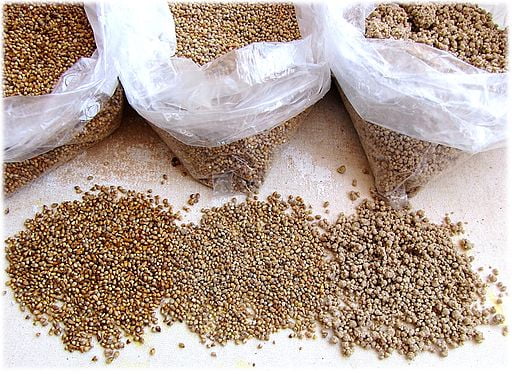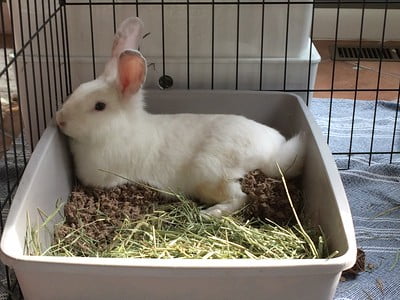Last Updated on March 18, 2023 by Marjon Ramos
How often you change your rabbit’s litter depends on how much smell you can tolerate. Remember that rabbits produce up to 300 poop pellets per day depending on the size of the breed, and they urinate up to eight times per day.
Another factor to consider is the type of litter your rabbit has. There are brands of litter out there that absorb the smell and moisture much better than others.
Also, the type of cage your rabbit uses is also important. Wood cages absorb the smell and moisture even after cleaning the litter. Stick to plastic and metal cages for easier clean-up.
Finally, your rabbit’s current health also plays a factor in determining how many times you change their litter. Rabbits that have digestive issues and rabbits that are unneutered exude stronger odors due to ammonia.
Table of Contents
What’s the size of your rabbit?
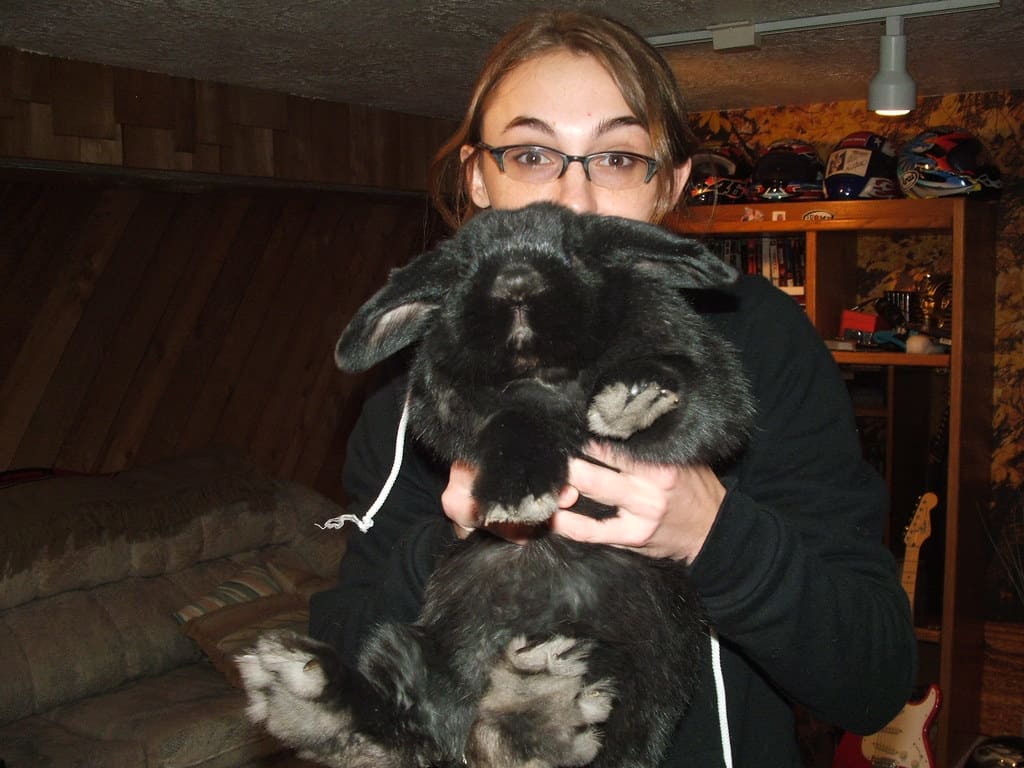
The bigger the rabbit, the more poop it excretes. If you have bigger breeds of rabbits, you need to change their litter more often if you don’t want your house to smell.
Here’s a table on the estimated amount of poop a rabbit produces based on weight:
| Rabbit’s weight based on breed | Poops produced per day |
|---|---|
| Small breed (1.1–3.5 pounds) | <113 grams |
| Medium breed (6 to 10 pounds) | 220-450 grams |
| Large breed ( 9 and 12 pounds) | >1000 grams |
And here is the table on how much rabbits urinate per day based on their weight:
| Rabbit’s weight based on breed | Urine produced per day |
|---|---|
| Small breed (1.1–3.5 pounds) | 60-180 ml |
| Medium breed (6 to 10 pounds) | 330-560 ml |
| Large breed ( 9 and 12 pounds) | 500-675 ml |
As you can see, rabbits are poop machines. If you have a medium-sized rabbit, you need to clean your rabbit litter every few days.
What kind of litter are you using?
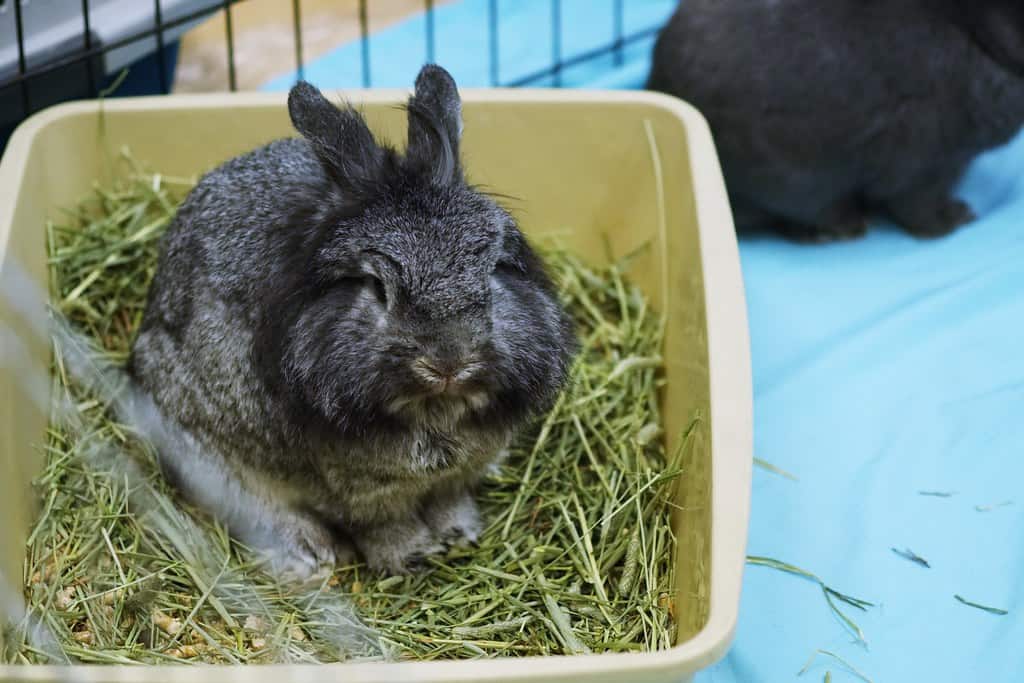
The type of litter that you are using is also important when determining the number of times you should clean your rabbit’s litter. If you’re using store-bought absorbent litter (I prefer wood-based litter), then you can stick to cleaning every few days.
If your rabbit’s litter is hay or paper, you need to clean it more often because the smell is worse due to trapped moisture.
Does your rabbit have any illnesses?
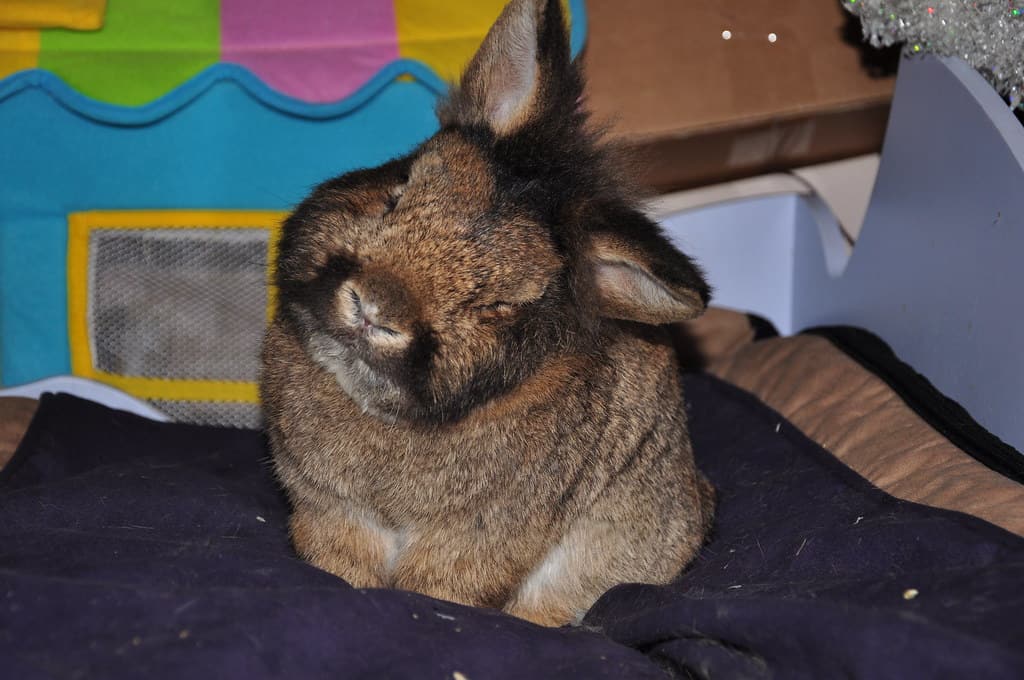
The frequency of cleaning your rabbit’s litter is also affected by its health. Rabbits who have diarrhea would obviously produce more foul-smelling stool.
While rabbits who are not neutered produce stronger-smelling urine due to ammonia. Also, unneutered rabbits will spray urine everywhere, so you will have to clean their place more often.
If your rabbit is suffering from digestive issues, it’s important to fix the problem by bringing your rabbit to a vet as soon as you notice it. Remember that a rabbit’s poop is not that smelly compared to other animals because their diet consists of plants.
Benefits of changing your rabbit’s litter box often
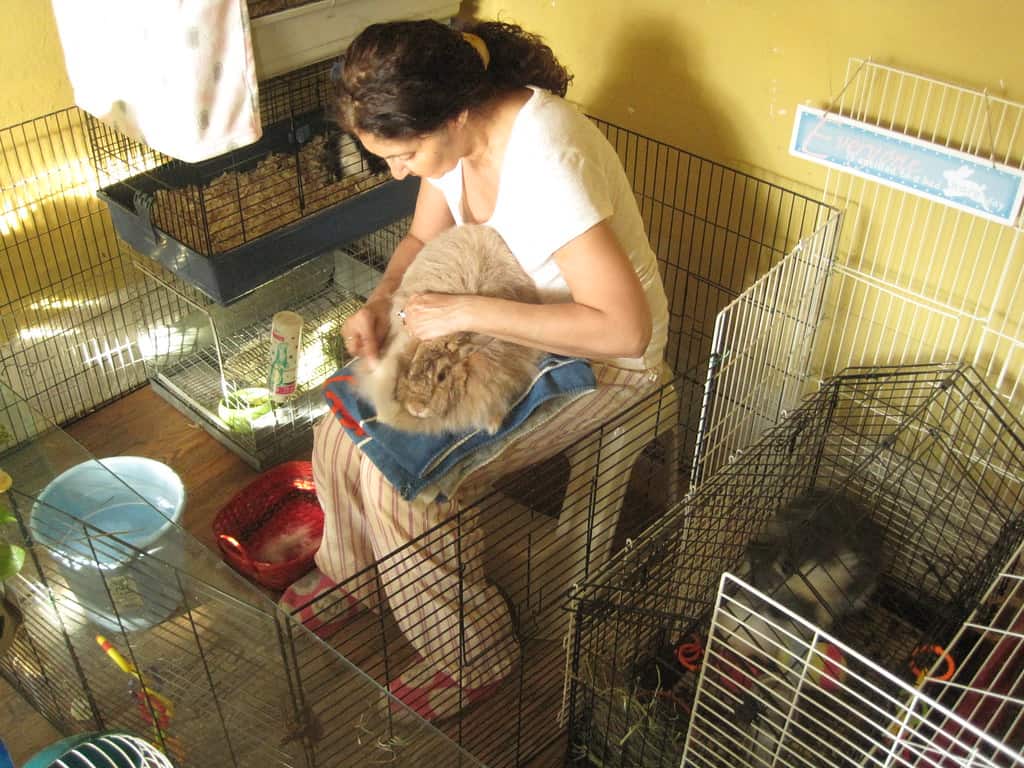
Happier rabbit
Rabbits are very tedious cleaners and will often spend large amounts of time cleaning themselves. A dirty litter or cage could cause stress to rabbits, who, in turn, would often act out by being aggressive or destructive.
It’s important to clean your rabbit’s litter and cage regularly. Cleaning your rabbit’s cage and litter once a week is not enough.
Nice smelling home
Another benefit of cleaning your rabbit’s litter more often is that you will have to endure the smell. Rabbit’s poop and urine would smell worse as time goes on.
It’s important to clean it as regularly as you can to prevent foul-smelling homes.
Less time cleaning
You might be thinking that cleaning your rabbit’s litter once a week would save you time, but it’s actually the opposite. It’s much better to clean every two days so that the amount of poop and urine is still manageable.
Here’s the math:
Let’s say you have a medium-bred rabbit:
Cleaning your rabbit’s litter every two days = 440–900 grams of poop and 660–1,120 milliliters of urine.
Cleaning your rabbit’s litter every week = 1,540–3,150 grams of poop and 2,310–3920 ml of urine.
Imagine cleaning 3 kilos of poop mixed in with 4000 ml of urine. Not to mention the smell of rabbit’s poop and urine gets worse as time goes on.
Summary
You should clean your rabbit’s litter depending on how much smell you can tolerate. Remember that the bigger the breed of rabbit, the more poop and urine it excretes.
The type of litter also plays a role in how often you clean it. Newspapers or hay don’t absorb the smell of urine and poop, so you would need to clean more often.
While store-bought litter that’s absorbent and designed specifically for rabbits would stretch out the cleaning time to a few days.
Also, if your rabbit has digestive issues, you have to clean it regularly. Rabbits that have diarrhea produce stronger-smelling stool. While unneutered, rabbits produce a stronger smell of ammonia in their urine.
Ideally, you should clean your rabbit’s litter every day. And the minimum should be cleaning your rabbit’s litter every two days.
Do not clean your rabbit’s litter once a week. It’s not enough and would stress out your rabbit due to their environment.
Cite this article:
Related Articles
- Can Rabbits Eat Asparagus? 9 things you need to know.
- Can Rabbits Eat Tomatoes? What You Need To Know.
- Can Rabbits Eat Watermelon? What You Need To Know.
- Can Rabbits Eat Grapes? What You Need To Know.
- Can Rabbits Eat Broccoli? What You Need To Know.
- Can Rabbits Eat Apples? What You Need To Know.
- Can Rabbits Eat Cabbages? What You Need To Know.
- Can Rabbits Eat Strawberries? What You Need To Know.
- Can Rabbits Eat Bananas? What You Need To Know.
- Can Rabbits Eat Oranges? 9 things you need to know.
- Can Rabbits Eat Blueberries? Here’s Why.
- Can Rabbits Eat Spinach? Your Questions Answered.
- Can Rabbits Eat Cucumbers? Here’s Why.
- Can Rabbits Eat Celery? What you need to know.
- Can Rabbits Eat Radishes: Everything You Need To Know
Sources and further reading
- Buseth, Marit Emilie., and Richard A. Saunders. Rabbit Behaviour, Health, and Care. CABI, 2014.
- Lebas, F. The Rabbit: Husbandry, Health, and Production. Food and Agriculture Organization of the United Nations, 1997.
- Patry, Karen, et al. The Rabbit-Raising Problem Solver: Your Questions Answered about Housing, Feeding, Behavior, Health Care, Breeding, and Kindling. Storey Publishing, 2014.
- Excessive drinking and urination
- How to Clean a Rabbit Cage

